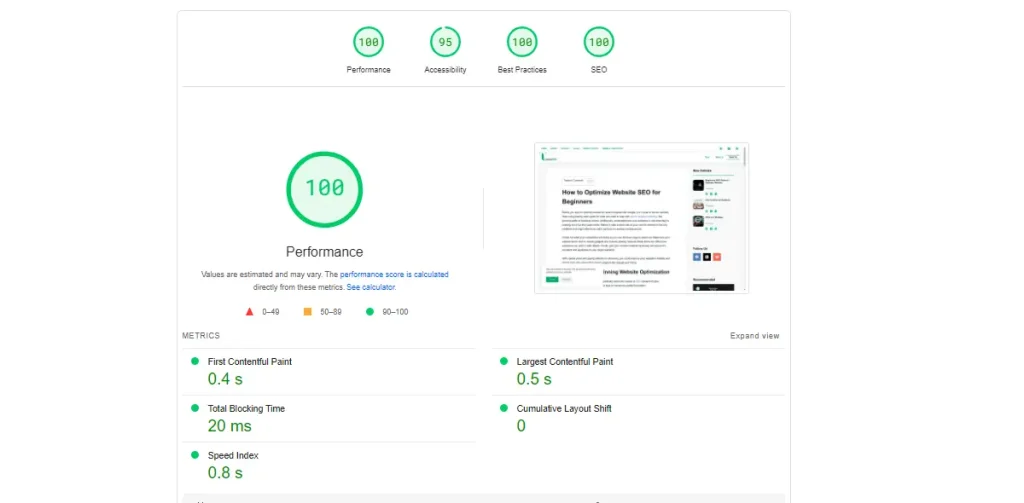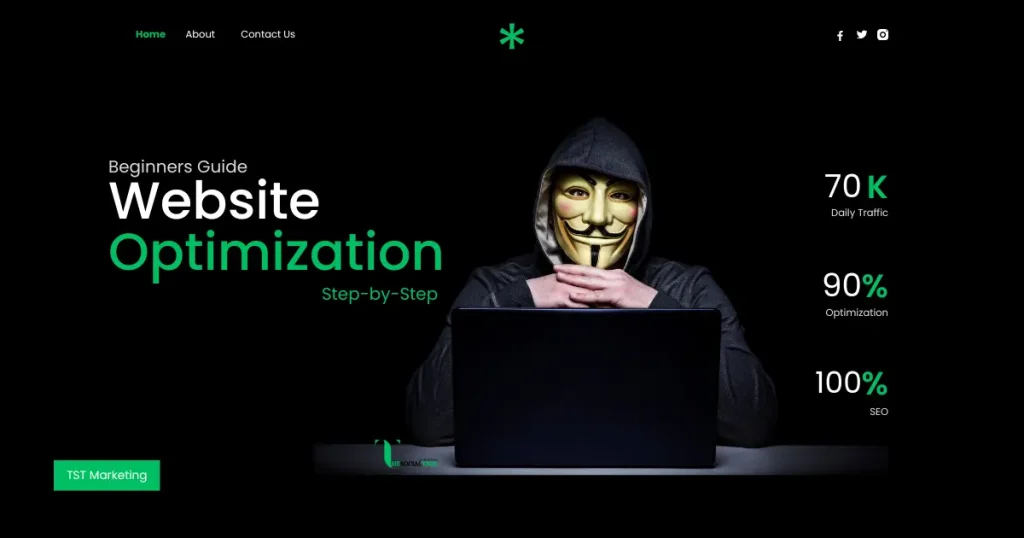Table of Contents
ToggleHow to Optimize Website SEO for Beginners
Before you start to optimize website for search engines like Google, it is crucial to devise carefully. Start using placing clean goals for what you need to reap with SEM, like growing traffic or boosting income. Additionally, understand who your audience is and what they’re seeking out once they seek online. Before it, take a close look at your current website to find any problems that might affect how well it performs in seeking consequences.
Check out what your competitors are doing so you can discover ways to stand out. Make sure your website works well on mobile gadgets and masses speedy, because these items can affect how excessive you rank in seek effects. Finally, plan your content material cautiously and ensure it’s excellent and applicable to your target audience.
With careful plans and paying attention to elements, you could improve your website’s visibility and attract more site visitors from search engines like Google and Yahoo.

Steps Before Beginning Website Optimization
Learning optimization of a website, specifically within the context of Search Engine Optimization, involves the number one step to construct a stable foundation:
- Understand the Basics: Start by grasping the essential ideas of search engine marketing. It includes key phrases, on-page optimization, off-page factors, and technical components like site pace and cell-friendliness.
- Keyword Research: Learn the way to conduct powerful keyword research to identify the terms and terms your target audience is attempting to find. Tools like Google Keyword Planner, SEMrush, or Ahrefs can help in this manner.
- On-Page Optimization: Gain talent in optimizing personal web pages to improve their seek engine ratings. In fact, this includes optimizing meta tags (name, description), headers, content material, and URLs using applicable keywords.
- Technical search engine marketing: Understand technical aspects like site structure, indexing, crawlability, and schema markup. At this time, ensure your internet site is technically sound and accessible to search engines.
- Content Creation: Learn to create first-rate, enticing content that addresses a person’s motive and incorporates centered keywords. Understand the significance of content material freshness, relevance, and multimedia integration.
- Off-Page SEO: Explore techniques to construct authority and credibility on your website. Without a doubt, you can do it through oneway link constructing, social media engagement, and neighborhood search engine optimization practices.
- Analytics and Monitoring: Familiarize yourself with gear like Google Analytics and Google Search Console to music performance metrics, interpret data, and make informed optimization choices. Consider social media monitoring in your strategy plan.
- Stay Updated: Search engine marketing is continuously evolving. So live knowledgeable from enterprise trends, set of rules updates, and high-quality marketing practices through blogs and courses.
Importance of an Optimize Website Beginners Guide
First and foremost, optimizing a website for engines like Google (search engine optimization) is essential for enhancing visibility and driving organic site visitors. Here’s a novice’s manual to help you get commenced with SEO:
1- Keyword Research
- Tools: Use tools like Google Keyword Planner, SEMrush, or Ahrefs.
- Strategy: Focus on relevant keywords with proper search volume and practicable competition.
2- On-Page Optimization
- Title Tags: Include the number one keyword near the start, maintain under 60 characters.
- Meta Descriptions: Obviously, you should summarize page content, and encourage clicks, below 160 characters.
- Headings (H1, H2, and many others.): Use headings to shape content material logically and consist of key phrases.
- Content Optimization: Ensure content material is relevant, informative, and consists of centered key phrases at the same time.
- URL Optimization: Use clean, readable URLs with feasible key phrases.
3- Technical search engine optimization
- Site Structure: Ensure a logical structure with clean navigation.
- Mobile Optimization: Ensure your site is mobile-pleasant (responsive layout).
- Site Speed: Besides site structure, website speed is also an important factor to optimize website. It aims for fast loading times; and uses equipment like Google PageSpeed Insights.
- SSL Certificate: Secure your website with HTTPS to construct trust and improve ratings.
4- Content Creation
- Quality: Create incredible, precious content that addresses consumer motives.
- Freshness: More importantly, update content frequently to keep it relevant and modern.
- Multimedia: Use pictures, movies, and infographics to enhance content.
5- Off-Page SEO
- Backlinks: Earn links from professional websites to improve authority.
- Social Signals: Engage on social media to grow logo visibility.
- Local search engine marketing (if relevant): Claim and optimize Google My Business list.
6- User Experience (UX)
- Navigation: Ensure smooth navigation and especially a person-friendly interface.
- Engagement: Increase live time with enticing content material and intuitive design.
- Mobile Experience: Optimize for mobile users to beautify usability.
7- Analytics and Monitoring
- Google Analytics: Track site visitors, user behavior, and conversions.
- Search Console: Monitor site overall performance, restoration issues, and optimize content.
8- SEO Best Practices
- Avoid Black Hat Techniques: (e.g., keyword stuffing, buying links).
- Stay Updated: search engine marketing algorithms evolve; live informed about enterprise traits.
- Patience and Persistence: Search engine marketing takes time; be patient and consistent with your efforts.
Benefits of How to Optimize Website Beginners SEO Guide
Website optimization, often known as search engine optimization (Search Engine Optimization), gives numerous key blessings that may substantially decorate your online presence and business fulfillment.
- Increased Visibility and Traffic: One of the most important blessings of optimizing your website is advanced visibility on SERPs like Google. By focusing on applicable keywords and optimizing your content material, you can appear better in search consequences, making it less complicated for ability customers to find you.
- Better User Experience: Optimization is not just about SERPs; it’s also approximately improving the enjoyment of your visitors. When your website is straightforward to navigate, masses speedy, and provides valuable content, customers are much more likely to stay longer and interact with your web page.
- Enhanced Brand Credibility: Appearing higher in search results alerts customers that your internet site is truthful and authoritative. This can raise your brand loyalty and encourage more visitors to choose your services or products over the competition.
- Cost-Effective Marketing: SEO can be a cost-effective advertising approach in comparison to traditional techniques like advertising and marketing. Once you’ve optimized your internet site and content material, it can retain to grow organic traffic through the years without ongoing costs for clicks or impressions.
- Long-Term Results: While SEO may also take time to peer significant consequences, the advantages may be long-lasting. Unlike paid advertising that prevents while you stop paying, optimized content can maintain to rank well and entice site visitors months or maybe years after it’s been posted.
- Competitive Advantage: In the modern competitive online panorama, agencies that put money into search engine marketing regularly have a part over the ones that do not. By staying in advance of algorithm adjustments and adapting your strategy, you may improve your rankings and stay competitive in your industry.
- Analytics and Insights: Optimization lets you music and examine data approximately your website’s performance. Indeed, tools like Google Analytics provide insights into visitor conduct, and which techniques are operating great in your business.
How to do SEO for a website step by step
I’m sharing a newbie’s manual for doing SEO for your website
Beginner’s Guide to SEO
1- Understand Your Audience
- Know what they look for: Use tools like Google Keyword Planner to discover what key phrases people use while searching.
2- Optimize Your Website
- Use key phrases evidently: Place keywords on your web page titles, headings (like H1, H2), and during your content. Furthermore, make sure it reads nicely for human beings, no longer simply search engines.
- Make it smooth for engines like Google: Ensure your website is technically sound. Additionally, use meta tags (like name and outline), have a clear website structure, and make sure your website loads speedy.
3- Create Great Content
- Be helpful: Write content material that answers questions your target market has. This could be blog posts, courses, videos, or infographics.
- Update frequently: Keep your content fresh and relevant. Google likes websites that can be energetic and up-to-date.
4- Build Links and Authority
- Get backlinks: Reach out to other websites and ask them to hyperlink for your content. Quality links from respectable websites can boost your credibility.
- Engage on social media: Share your content on structures wherein your target market hangs out. This can pressure site visitors and construct your logo.
5- Measure and Improve
- Use gear: Set up Google Analytics to track how your internet site is appearing. Look at which pages are famous, where your site visitors come from, and the way they behave on your website online.
- Make changes: Use the statistics to improve your internet site. In addition, you need to tweak your content, optimize for distinctive key phrases, or restore technical issues.
5- Stay Updated
Keep gaining knowledge of SEO adjustments over the years. Stay up to date with blogs, publications, and industry news to hold your techniques powerful. It is equally important.
First, you may start improving your website’s visibility in search engine outcomes by following these beginner steps. And appeal to more site visitors who are interested in what you have to offer. Search engine marketing takes effort and time. However, with persistence and consistency, you may see your website climb the ranks.
Conclusion:
Optimizing a website for search engines like Google and Yahoo entails numerous foundational steps that might be essential for improving your website ranking. Moreover, by understanding search engine optimization, thorough keyword research, and enforcing on-web page, technical, and rancid-web page optimization techniques, you can rank your website.
Undoubtedly, the benefits of site optimization are manifold, consisting of improved visibility on SERPs, better consumer revel, superior logo credibility, fee-powerful advertising, lengthy-term results, aggressive gain, and access to treasured analytics and insights. By investing in search engine optimization and staying updated with industry tendencies, you can role yourself competitively in the digital panorama.

